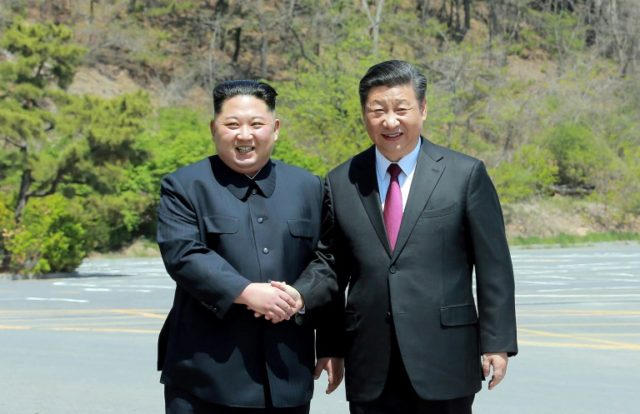China’s Communist Party leader Xi Jinping celebrated his country’s ties to North Korea Wednesday during a meeting to welcome a delegation from Pyongyang in town to learn how to replicate the Chinese economy domestically, proclaiming that the bilateral relationship is “sealed in blood.”
While Chinese state media outlets Xinhua and the Global Times covered the meeting, North Korea’s state-run Korean Central News Agency (KCNA) published a paraphrased version of Xi’s remarks.
South Korean news service Yonhap reported that KCNA quoted Xi as saying that “China is attaching very importance [sic] to the work to propel the traditional friendship between the two countries sealed in blood to a higher stage as required by the new era.”
Xi also “noted with pleasure that he met Chairman Kim Jong-un two times and exchanged the comprehensive and detailed views on the matters of concern including the development of the relations between the two parties and the two countries and the regional and international situation.”
The “blood” comment is notable due to both the longstanding North Korean policy against race mixing and Xi Jinping’s initiatives to impose Mandarin as a national language and replace ethnic minorities in China with Han Chinese. While the Han Chinese – the majority in the country – and Koreans are not the same ethnicity, both nations have used their respective communist systems to eradicate ethnic diversity.
In North Korea, the Kim regime imposes a strict caste system known as “songbun,” which ensures that families of Koreans who have been loyal to the Kim family for generations are treated to the best the country has to offer, while entire families can be banned from Pyongyang or sent to labor camps if one of them behaves in a way interpreted as a challenge to the Kim cult. The regime teaches children at a young age that Kim Il-sung, the founder of North Korea and grandfather of Kim Jong-un, is the father of a Korean master race that they must worship. North Korean defectors say the regime regularly forces women to have abortions or kills their infants if they cannot guarantee that the father of the child is also ethnically Korean.
While China also engages in forced abortions, that government does not do so to ensure ethnic purity, but rather to enforce its two-child policy. Instead, Xi Jinping has begun to enforce Han supremacy through the imposition of Mandarin language – putonghua, or the “common tongue” – in schools where most of the population speaks a minority language. This policy has been particularly prevalent in western Xinjiang province, where the majority of residents are Uighur Chinese and speak the Uighur language.
Just as China imposes Han ethnic identity within its borders, it, too, demands control over ethnic Han Chinese abroad, regardless of their citizenship, and insists that Taiwan is a central part of China because of the genetic ties between its inhabitants and those in Beijing.
The Workers’ Party of Korea (WPK) group visiting China this week is primarily there to observe China’s socialist economic model in the hope that North Korea can replicate it following talks with South Korean President Moon Jae-in and American President Donald Trump. According to the Global Times, “the delegation includes party secretaries of all of North Korea’s provinces and cities,” who heard from Xi that China “supports North Korea’s economic development and improvement in people’s livelihood, and will back North Korea’s development path that is suitable for its own situations.”
On Tuesday, Chinese Foreign Ministry spokesman Lu Kang explained that, throughout their stay, the North Koreans would “make some tours to learn about China’s achievements in economic development and reform and opening-up and promote an exchange of views between the WPK and the CPC on state governance.” Unnamed sources told South Korean news outlets that the delegation was seeking specific knowledge on how to build a semi-capitalist economy without abandoning its repressive regime or allowing an open market of ideas that could lead to democracy.
The delegation’s visit follows two such trips by dictator Kim Jong-un himself. In March, Kim made his first trip abroad as head of state to Beijing, where Xi Jinping regaled him and wife Ri Sol-ju with lavish gifts experts estimated to be worth nearly $400,000. This month, Kim returned, this time to the seaside resort city Dalian, where he met with Xi and toured the sights.

COMMENTS
Please let us know if you're having issues with commenting.